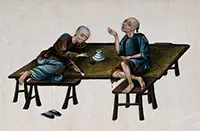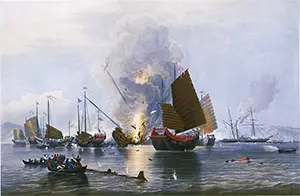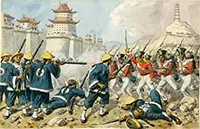The Opium Wars
The Opium Wars were a pair of major violent conflicts fought beween China and the United Kingdom in the mid-19th Century. The U.K. won both wars, in the process forcing China to sign humiliatingly unequal treaties and weakening the prestige of the Qing Dynasty. As European powers spread their influence far and wide in the late Middle Ages, China continued on as the superpower of Asia. Echoes of the Silk Road still existed, sending Chinese goods like porcelain and silk to the West. Of particular demand in the U.K. as the 19th Century progressed was Chinese tea. In the other direction along the fabled Silk Road traveled cotton, to China, from the U.K., via India. China also accepted silver as payment for porcelain, silk, and tea, but the demand in China for other Western goods wasn't very strong. 
In 1757, the Qianlong Emperor declared that the southern city of Guangzhou would be the only port that Western trade ships could enter. (The Western name of the city was Canton, and this became known as the Canton System.) As well, Western traders could deal only with licensed Chinese merchants. From a Western point of view, this was a severe restriction of trade. The U.K., especially, espoused the idea of free trade, and the implementation of the Canton System was a source of friction between the two countries. 
Near the beginning of the 19th Century, the U.K. shifted away from Indian cotton as an export to China and instead favored Indian opium, which was used for medicinal purposes but was far more popular as a recreational drug. The opium came from the Bengal region of India, and directing the opium trade was the British East India Company. Chinese emperors had made opium illegal on a number of occasions, but that didn't stop the trade or consumption of the illicit drug. Users became addicted and suffered severe medical difficulties if they didn't have steady access. Traders became smugglers in order to avoid Chinese government penalties. In succession, the Jiaqing Emperor and the Doaguang Emperor engaged in a series of crackdowns on opium smuggling. The most severe came in the 1830s, led by Lin Zexu, the governor of Guangzhou. Near the end of that decade, he ordered the arrest of more than 1,500 Chinese opium dealers and ordered their opium supply destroyed. Further, Lin Zexu ordered any U.K. merchants who had supplies of opium to turn them over; the subsequent refusal led China to stop all foreign trade. Lin Zexu escalated tensions in April 1839 by ordering his troops to board U.K. ships and seize the opium on those ships. Two months later, a brawl involving American and U.K. sailors in Kowloon resulted in the death of a Chinese man and destruction of a Buddhist temple. This became known as the Kowloon Incident. Chinese officials demanded that the U.K. hand over its sailors so they could be tried in a Chinese court. In response to the expected refusal, China declared that all foreign traders would have to agree to abide by Chinese laws before trade could resume. For the government of Queen Victoria, that was the last straw. The U.K. declared war on China. 
One thing that was evident from the beginning of the conflict was the technological gap between the two opponents. Chinese ships, weapons, and even military strategy and training were not as advanced as those of their U.K. opponents. After an initial quick victory in November 1839, the U.K. settled in for a war to protect their opium trade and their overall influence in the region. As the months went by, U.K. ships were more and more successful, sinking many Chinese ships and seizing several key Chinese ports, including Shanghai, at the mouth of the Yangtze River. Victories combined army and navy strength. At both, Chinese defenders found themselves outmanned and outgunned. Port after port was lost: Fuzhou, Guangzhou, Nigbo, and Xiamen among them. It was the loss of Shanghai that convinced the Chinese emperor that it was time to stop the fighting. On Aug. 29, 1842, China agreed to the Treaty of Nanking, which was a very unequal agreement. Among the terms:
China had already suffered tremendous losses of life, and the war had damaged the economy. The Treaty of Nanking dealt the Qing Dynasty a blow to its prestige as well. Seeing what looked to be weakness, high-level representatives of both France and the United States pressed the Chinese emperor to forge "agreements" of a similar vein and had results similar to those obtained by the U.K. Chinese leaders found themselves reluctant to abide by such humiliating proscriptions and held back on fulfilling some of their promises. The outbreak of the Taiping Rebellion in 1850 made matters worse for the Qing Dynasty. A Utopian hopeful named Hong Xiuquan established a dream of a society known as the Kingdom of Heavenly Peace. Thousands flocked to the ideal and set up a rival capital in Nanjing. The emperor's response was to employ all manner of cruel tactics, in an attempt to subdue the insurrection. Amidst the internal unrest, the U.K. again pressed its advantage, demanding more concessions beyond those of the Treaty of Nanking. An incident in 1856 rattled sabers in both empires. Chinese officials boarded the U.K. ship Arrow and arrested its crew on suspicion of smuggling. The ship was based in Hong Kong, and the U.K. demanded that China release the ship and its crew. Even though Chinese officials did both, the U.K. seized another opportunity and began another war, targeting Chinese forts and ports. 
France joined the U.K. in prosecuting the Second Opium War, after Chinese officials arrested a French missionary who later died in jail. By mid-1858, China had lost Guangdong, Guangzhou, and a series of forts known as the Taku, near Tianjin (Tientsin). China surrendered in June 1858, signing the punitive Treaty of Tientsin. Among the terms of that treaty were these:
By this time, China had a new ruler, the Xianfeng Emperor, who initially agreed to the terms of the treaty but then reneged. In response, armies from France and the U.K. defeated a Qing army and stormed into Beijing, looting and burning the emperor's Summer Palaces in the process. The emperor finally agreed to abide by the terms of the treaty, only to find that the victors had more demands. A revised version of the Treaty of Tientsin, signed on Oct. 18, 1860, legalized the opium trade and gave the U.K. possession of parts of coastal Kowloon, which was across from Hong Kong. The Taiping Rebellion consumed China for another four years after that, further weakening a once dominant dynasty. |
|
Social Studies for Kids
copyright 2002–2024
David White




